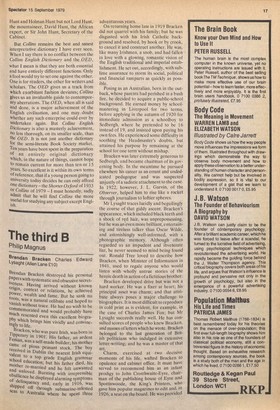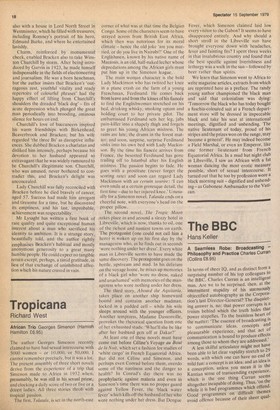The third B
Philip Magnus
Brendan Bracken Charles Edward Lysaght (Allen Lane £10) Brendan Bracken destroyed his personal Papers with systematic and obsessive secretiveness. Having arrived without known origin, context or relations, he achieved Power, wealth and fame. But he sank no roots, was a natural celibate and hoped to vanish without trace. He had no wish to be commemorated and would probably have much resented even this excellent biography which brings him vividly and convinc ingly to life. Bracken, who was pure Irish, was born in Tipperary in 1901. His father, an ardent Fenian, was a self-made builder; his mother came of pious peasant stock. The boy received in Dublin the nearest Irish equivalent to a top grade English grammar school education; but his father died, his mother re-married and he felt unwanted and Unloved. Bursting with irrepressible ebullience he displayed alarming symptoms of delinquency and, early in 1916, was shipped off through submarine-infested seas to Australia where he spent three adventurous years.
On returning home late in 1919 Bracken did not quarrel with his family; but he was disgusted with his Irish Catholic background and resolved, by hook or by crook, to cancel it and construct another. He was, like many Irishmen, a snob, and had fallen in love with a glowing, romantic vision of the English traditional and imperial establishment. He set out, accordingly, with sublime assurance to storm its social, political and financial ramparts as quickly as possible.
Posing as an Australian, born in the outback, whose parents had perished in a bush fire, he decided to acquire a public-school background. He earned money by schoolmastering in Liverpool for two terms, before applying in the autumn of 1920.for immediate admission as a schoolboy to Sedbergh, where he pretended to be 16 instead of 19, and insisted upon paying his own fees. He experienced some difficulty in soothing the Headmaster's doubts, but attained his purpose by remaining at the . school for one term without mishap.
Bracken was later extremely generous to Sedbergh, and became chairman of its governing body. In the meantime he pursued elsewhere his career as an errant and undedicated pedagogue and was suspected unjustly of a sadistic attachment to the cane. In 1922, however, J. L. Garvin, of the Observer, helped him to rise like a rocket through journalism to loftier spheres.
Mr Lysaght traces lucidly and beguilingly the course of that giddy ascent. Bracken's appearance, which included black teeth and a shock of rd hair, was unprepossessing, but he was an even more brilliant, entertaining and tireless talker than Oscar Wilde, and astonishingly well-informed, with a photographic memory. Although often regarded as an impudent and inveterate liar, he never seemed to mind being found out. Ronald Tree loved to describe how Bracken, when Minister of Information in 1941, used to regale anyone who would listen with wholly untrue stories of the heroic death in action of a fictitious brother.
Bracken developed drive but was not a hard worker. He was a fixer at heart; his principal asset was charm; and that attribute always poses a major challenge to biographers. It is most difficult to reproduce in cold print as is evident, for example, in the case of Charles James Fox; but Mr Lysaght succeeds really well. He has consulted scores of people who knew Bracken, and masses of letters which he wrote. Bracken belonged to the last generation of British politicians who indulged in extensive letter-writing; and he was a master of that art. Charm, exercised at two decisive moments of his life, wafted Bracken to opulence and cabinet office. It must have served to recommend him as an infant prodigy to John Crosthwaite-Eyre, chairman of the publishing house of Eyre and Spottiswoode, the King's Printers, who gave him popular magazines to edit and, in 1926, a seat on the board. He was provided also with a house in Lord North Street in Westminster, which he filled with treasures, including Romney's portrait of his hero, Edmund Burke, and where he entertained lavishly, Charm, reinforced by monumental cheek, enabled Bracken also to take Winston Churchill by storm. After being. introduced by Garvin in 1923, he made himself indispensable in the fields of electioneering and journalism. He was a born henchman, but the author insists that Bracken's 'outrageous zest, youthful vitality and ready repertoire of colourful phrases' had the happy effect of lifting from Churchill's shoulders the dreaded 'black dog' — fits of acute depression which plunged the great man periodically into brooding, ominous silence for hours on end.
Churchill's love of buccaneers inspired his warm friendships with Birkenhead, Beaverbrook and Bracken; but his wife regarded 'the three Bs' as disruptive influences. She dubbed Bracken a charlatan and disliked him intensely, perhaps because his devotion to her husband appeared so extravagant that he was widely rumoured to be Churchill's illegitimate son. Churchill, who was amused, never bothered to contradict this, and Bracken's delight was unconcealed.
Lady Churchill was fully reconciled with Bracken before he died bravely of cancer, aged 57. Success had made him arrogant and tiresome for a time, but he discovered its emptiness, and his last, improbable, achievement was respectability.
Mr Lysaght has written a first book of rare quality and quite exceptional human interest about a man who sacrificed his identity to ambition. It is a strange story, beautifully told, and the author rightly emphasises Bracken's habitual and mostly anonymous generosity to a great many humble people. He could expect no tangible return except, perhaps, a timid gratitude, in lieu of that exchange of uninhibited affection which his nature craved in vain.



































 Previous page
Previous page